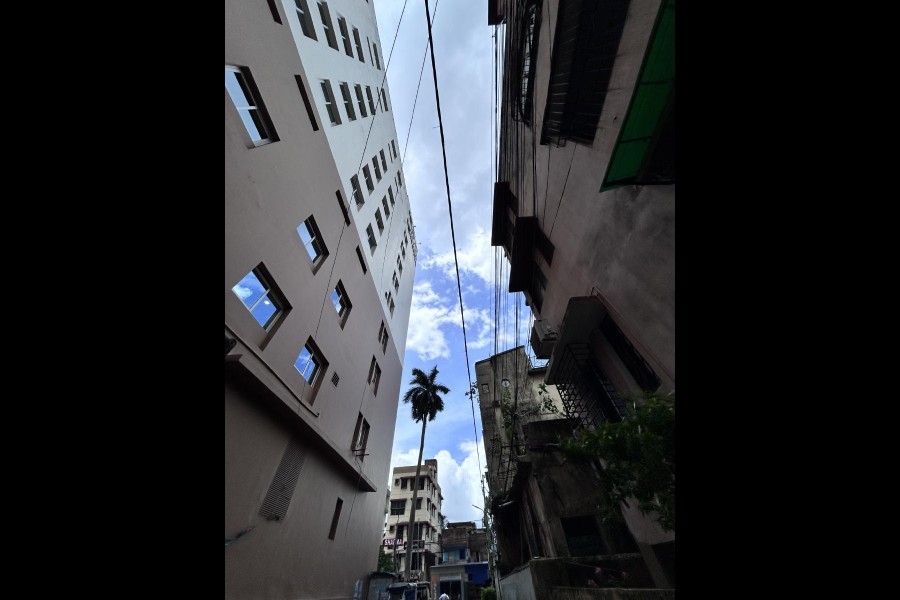There is no history behind Hawa Gali,” says Dodul Dasgupta. The 70-year-old is talking about a narrow lane in south Calcutta’s Ganguly Bagan area. Dasgupta’s apartment is one of the few buildings on the lane that has a strange claim to fame — it experiences round-the-clock wind surges.
Dasgupta’s extended family of 41 has been living in the area since 1949. The family home Lalabari used to run along the entire length of the gali. A grim old Dabur factory stood on the other side. People rarely went that way.
In 1994, Lalabari gave way to two apartment buildings and one house. Then another decade passed and the factory too was replaced — with a shiny, new state-of-the-art hospital building. The 10-
storeyed hospital runs the entire length of the lane.
The towering hospital wall, locals believe, is responsible for the stuttering gust of wind that blows through the gali. The wall gets in the way of the wind, making it crash upon it before it rushes out of the lane, strong and lusty and a continuous source of delight to the old and young.
You could say the hawa changed the gali. It went from being a deserted area with a kutcha road to a popular hangout for locals. No adda spot in Calcutta is complete without arrangements for tea. Here too, Rina Mistri, another lane resident, set up a tea stall in the middle of the lane. She says, “Things fell into place after the hospital was built. The road got better, more people started coming and my business took off.”
Retired gentlemen on their evening walks, young housewives when their children are away for evening tutorials, and young men on their way home from work turn up at the Hawa Gali.
They relax into the breeze and stir up fresh adda with steaming cups of tea.
A wood workshop faces the entrance to the lane. It is packed with planks and logs. A fan whirring on the side is the shop’s only source of ventilation. Shopowner Jagdish Prasad Rajbhar tells The Telegraph, “Sometimes, I can feel the natural breeze even when I am working inside my shop.” He adds, “It is a relief during the summers.”
The gali appears just like any other residential area of south Calcutta. But during the rush hours of traffic, when autorickshaws and bikes stop by, commuters experience the wind lunging at them, tousling their hair, cooling their sweat... They are possibly surprised, amused and refreshed. “During summers, people gather here as if it is a mela,” says Rina Mistri, who keeps her tea shop open till as late as 10pm.
And then there are those, who regularly haunt Hawa Gali. Chandan Kumar Rajat is one of them. He is a driving instructor by day. After work, in the evenings, he says he loves strolling down the lane. There is a cement bench at one end of it. It gets filled up by a group of elderly men as soon as the clock strikes 8pm. Rajat has no choice but to squat on the hospital fence and quietly enjoy the breeze.
The gathering of elders is buzzy. Emanating from it are noisy arguments. They laugh out together when told their spot, their good-old Hawa Gali, is the subject of a newspaper feature.
After the initial hesitation, they anoint Kamal Gupta, 68, as their spokesperson. Gupta tells The Telegraph, “Today we are debating who is a higher ranking officer — an IPS
or an IAS.”
Gradually, the rest of the group starts chipping in. Dibyendu Ghosh, 84, says, “Every evening we end up debating something or the other.” Art, culture, cinema, politics, education, nothing is out of bounds for this group.
Balai Raha, 87, interjects, “No, we don’t discuss politics because it’s too dirty nowa-
days.” Dilip Chakraborty, 65, agrees. He says, “We are afraid a discussion over politics might divide us. We don’t want to get too serious here.” Gupta adds, “Even though we try to avoid it, we always land up in political debates.”
More chuckles, more laughter.
None of them lives in the immediate neighbourhood. Ghosh says, “Our daily lives have gotten quite boring and monotonous since retirement.” Then he spreads his arms around, gesturing at the people, the gali and the area around him. He says, “This is our recreation.” Chakraborty nods along.
As if to remind them once again why they have chosen this gali as their meeting
spot, a gust of wind runs through them. With windswept hair, untucked shirt and a grinning face, Gupta gets up from the bench. With a twinkle in his eyes, he asks, “Can you feel it?”











